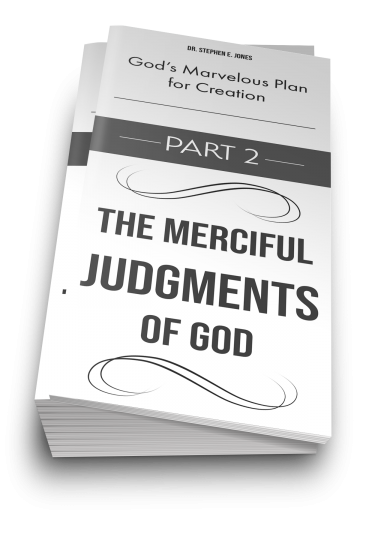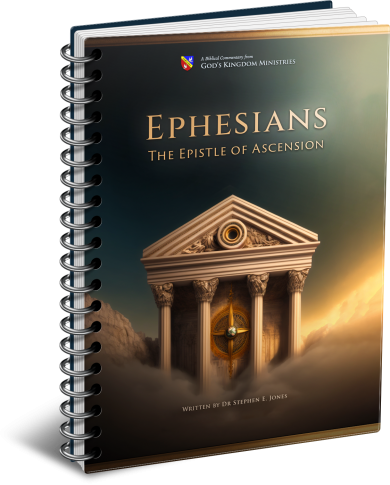If you know any Christians, the chances are good that they have told you that you will “spend eternity in hell” if you do not accept Jesus or perhaps if you do not join their church or organization.
The Bible does not actually teach this. The Bible teaches that hell is the grave and that it is temporary because it ends at the resurrection of the dead. Neither is it a place of conscious torture in a superheated fire.
The “fire” is a metaphor for the judgment of the law. God’s law never prescribes torture as a punishment for sin. Because the judgment must always be administered in direct proportion to the crime, it must always end at some point. No man can commit so much sin in one life time that he must be eternally punished.
The Bible says that God’s judgments are eonian, not eternal. Eon is a word that means “an age,” which is an unspecified or unknown time period. It is actually the Greek equivalent for the Hebrew word olam, which also means a hidden or unknown period of time. In the end, the law of Jubilee limits judgment to 49 years.
The law of God is an expression of God’s nature. God is love. No judgment of God is devoid of love. Never-ending punishment is not an expression of love. If we were to punish our own children endlessly without forgiveness, it could hardly be said that we love them.
The same is true with God Himself. The judgments of God are designed to correct His children, not to destroy them or lose them. There is always a good purpose in divine judgment, because its goal is to restore one’s relationship with God. God’s judgments are merciful.
The Fiery Law
The Bible speaks of a final judgment at the end of the Millennial Age. All who have died in past years will be raised from the dead and will be summoned to the throne of God to give an account of themselves.
There all wrongs will be righted, and restitution will be made to all victims of injustice as prescribed in the law of God. The application of God’s law is pictured as a “fire,” but this was never to be taken literally.
This metaphor is based upon legal terminology in Deut. 33:2, which speaks of “the fiery law.” When God gave Israel the Ten Commandments, He spoke out of the midst of fire (Deut. 5:24). Because the law was a revelation of the nature of God, it was also written that “the Lord your God is a consuming fire” (Deut. 4:24).
Later, the prophet Daniel had a vision where he saw God seated upon a fiery throne. Dan. 7:9 and 10 says,
“His throne was ablaze with flames, its wheels were a burning fire. A river of fire was flowing and coming out from before Him… The court sat, and the books were opened.”
A throne is an ancient symbol of law. When a king or a judge sat upon a throne, he was judging the people by the law of the realm. So when God’s throne was pictured as a fire with a river of fire flowing out to the people being raised, it pictures the judgment of the law of God.
The law corrects injustices and eliminates (or “burns up”) all injustice by forcing lawbreakers to make things right—usually to pay restitution to their victims. The ultimate purpose of such judgment was not to torture the sinner but to rehabilitate him through discipline.
That was always the loving purpose of the law of God. In fact, the law even gave sinners certain rights. Sinners had the right not to be punished disproportionately. The judgment was always to be directly proportional to the crime itself. Exodus 22:1-4 says,
“If a man steals an ox or a sheep, and slaughters it or sells it, he shall pay five oxen for the ox and four sheep for the sheep… If what he stole is actually found alive in his possession, whether an ox or a donkey or a sheep, he shall pay double.”
Today, animal theft accounts for only a tiny portion of crime. More often, people steal other things that have value. The judgment of the law, then, would usually force the convicted thief to pay double restitution, rather than four or five times the value of an animal.
The point is that the judgment of God’s law is always in direct mathematical proportion to the crime itself. The law of God sets the standard of righteous judgment and establishes the definition of true justice according to the nature of God and His love. Torture itself is a sin, and this is why it is contrary to the nature and will of God.
Sin is Treated as a Debt
All sin is reckoned as a debt in God’s system of justice. That is why the Lord’s Prayer reads two different ways:
Matt. 6:12 reads,
“And forgive us our debts, as we also have forgiven our debtors.
Luke 11:4 reads,
“And forgive us our sins, for we ourselves also forgive everyone who is indebted to us.”
If a man sinned against his neighbor, the judgment was that the sinner owed his neighbor a debt. The amount of the debt was determined by the seriousness of the crime. If the sinner was unable to pay his debt, he was not sent to prison but put to work to pay off his debt.
The law says in Exodus 22:3, “if he owns nothing, then he shall be sold for his theft.” In other words, he is forced to work for the one who is willing to pay the most for his labor. His sentence might be for a day, or a week, or a month, or even for many years, depending on the seriousness of the crime and the size of the debt.
But God’s law does not allow prisons as such. Prisons violate the rights of both sinners and their victims. If a thief is sent to prison, he is punished, but justice is left undone. The victim seldom receives compensation for his loss, and the sinner is prevented from paying his debt to the victim. How, then, can he find forgiveness?
The purpose of God’s justice is twofold. First, it is to compensate the victim for his loss. Second, it is to provide the way for the sinner to receive forgiveness and restoration in the nation. True justice is not done until these two objectives have been met.
When Restitution is Not Possible
There are some crimes that cannot be measured in terms of restitution payments. Premeditated murder, rape of a married woman, kidnapping, etc. are examples of such crimes. These cases call for the death penalty, unless the victim (or a representative) forgives him.
The death penalty is not the final judgment. Death only postpones the judgment until the Higher Court can judge the case later. There is no restitution for murder because the earthly court lacks the ability to restore the lawful order. So the case is appealed to a Higher Court.
When God raises the dead at the end of time and judges the world, He has the power to address this problem. First of all, He has the power to raise the dead. Second, He can put the murderer to work for two normal lifetimes or more. Such solutions are not possible in our earthly courts, but God is not restricted in any way.
The death penalty, then, should be viewed as an appeal to the Higher Court for justice at a future time. The sinner is not sentenced to spend eternity in “hell,” but will be sentenced to labor in service of the Kingdom.
That is the “lake of fire,” or the judgment of the law. To torture the sinner in a literal fire could never repay the victims of injustice. Neither could eternal punishment ever restore a sinner to the place of full forgiveness.
What about Hell?
The English word “hell” is an old word that used to mean the grave, or to cover someone or something. We still have many English words that reflect this.
A helmet, for instance, covers one’s head. A helot is a serf, or one who is under the authority of a master. They used to “hell” potatoes by putting them in a root cellar.
Hell is not prescribed in the law of God—unless we define it in a biblical way. Hell itself is simply “the grave,” as we read in 1 Cor. 15:55, where Paul asks,
“O death, where is your sting? O grave [hell], where is your victory?”
This is the only time that Paul mentions “hell” in all of his writings, and he wrote that hell itself was to be destroyed. He was quoting from Hosea 13:14,
“I will ransom them from the power of the grave [hell]; I will redeem them from death; O death, I will be thy plagues; O grave [hell], I will be thy destruction.”
God was telling us that He intended to destroy hell, or the grave. How? By means of resurrection from death. In the end, resurrection destroys hell, even as life destroys death, for we read in Rev. 20:14,
“And death and hell were thrown into the lake of fire. This is the second death, the lake of fire.”
The first death (mortality) is the judgment for Adam’s sin. We die because of his sin. The second death is the judgment for our own sins. The second death is “the lake of fire,” which is formed by the “river of fire” in Dan. 7:9. The only time that one could be judged by a literal fire is if they burned someone else. Once again, the judgment fits the crime. Exodus 21:24, 25 says,
“eye for eye, tooth for tooth, hand for hand, foot for foot, burn for burn, wound for wound, bruise for bruise.”
So if a man unjustly burned someone alive, he could be liable for the same treatment at the last judgment. But even this, though painful, would not last forever.
Forgiveness is the Goal
The Bible says that we have all sinned. The question is not how big a sinner we are but how to find forgiveness and restoration with our Father God who loves us.
It is good to pay restitution to those we have sinned against, so that earthly relationships can be restored. However, the deeper problem is how to obtain God’s forgiveness so that we can be restored to Him and be all that God intended His children to be.
One key is in knowing the law of victim’s rights. The victims of crime have the right to be recompensed but they also have the right to forgive. When Jesus was put on the cross, He took responsibility for every sin and thereby became the victim of every sin ever committed.
By law that gave Him the right to hold sin against all of humanity—or to forgive it. Luke 23:34 says that He chose to forgive. He prayed, “Father, forgive them.”
The law of God then set the world free, because the law had no right to deny Jesus’ petition. Jesus knew His rights, and He understood His purpose for dying. God’s judgments are indeed merciful!



